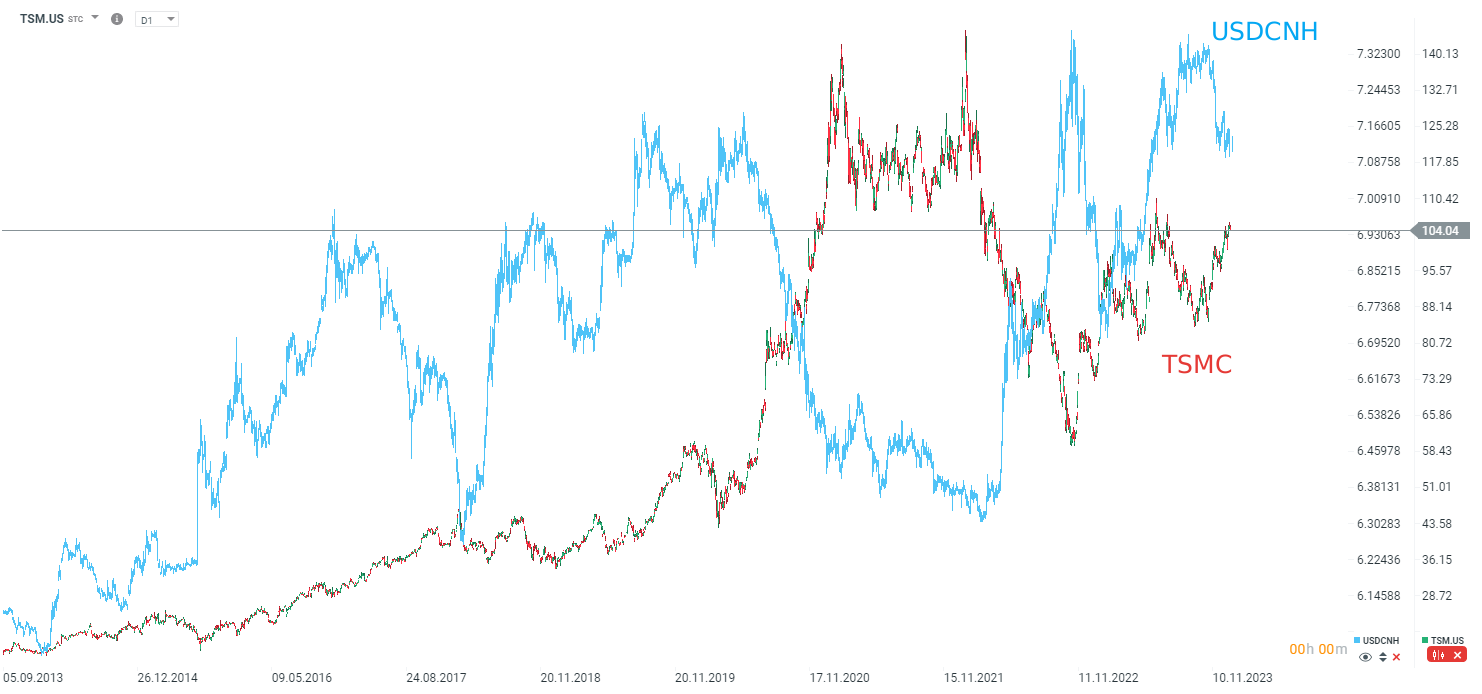One of the key geopolitical events at the beginning of 2024 is the presidential and parliamentary elections in Taiwan, scheduled for January 13. Although polls indicate that the current "tense" status quo would likely be maintained, recent verbal threats from China leave some uncertainty. Why is Taiwan crucial for the global and Chinese economies? What could the victories of individual candidates mean? Will China opt for more radical actions?
Global technological superpower
Taiwan belongs to the so-called group of Asian Tigers. It is the world's largest producer of semiconductors, so any military actions in Taiwan would lead to a technological crisis, likely causing a global economic collapse. TSMC (Taiwan Semiconductor Manufacturing Company) is the largest semiconductor manufacturer, holding almost 58% market share according to TrendForce, continuing its growth from previous quarters. Samsung is in second place with a share of only 12.4%. It's worth noting that TSMC produces semiconductors on behalf of other companies and does not manufacture chips for its own use under its own brand. Interestingly, TSMC doesn't just produce for companies like Apple but also for other key players in the chip sector such as AMD and Nvidia. These companies can be seen more as partners than competitors. Although TSMC is a crucial chip supplier to China, armed conflict on the island could lead to a total technological crisis worldwide.
Taiwan is not just about TSMC; it's also home to Acer, Asus, and Foxconn, other well-known electronics manufacturers. Interestingly, the founder of Foxconn, Terry Guo, is running in the presidential elections in Taiwan, but currently ranks fourth in polls, with little chance of winning.
Genesis of China-Taiwan conflict
The conflict between China and Taiwan dates back to the 17th century when the island came under Chinese jurisdiction. Shortly before the year 1900, Taiwan fell under Japanese rule during the ongoing war. After World War II in 1945, Taiwan once again came under Chinese administration. However, dissatisfaction with the rule of the Kuomintang party led to significant unrest in Taiwan, ultimately resulting in riots. The Chinese Civil War and Mao Zedong's victory led to the escape of the Chinese authorities to Taiwan.
Taiwan, also known as the Republic of China, does not recognize the authorities on the mainland. Simultaneously, it has not officially declared independence, making it challenging to maintain diplomatic relations with both China and Taiwan. China follows a policy of unity and has announced plans for reunification by 2049. Chinese authorities emphasize that any declaration of independence by Taiwan would be met with military intervention. This is why China is not in favor of the current ruling party, the Democratic Progressive Party (DPP), winning, as it could not only prolong the current deadlock but also escalate tensions.
Polls hint at DPP staying in power
Current Vice President Lai Ching-te from the DPP (Democratic Progressive Party) is running in the presidential elections. The incumbent president, Tsai Ing-wen, has held her office twice since 2016, a period marked by a significant escalation in tensions between China and Taiwan. The choice of Lai Ching-te may indicate the maintenance or even worsening of the current status. The DPP emphasizes that under its governance, the country has strengthened its autonomy and security through closer ties with countries such as the United States and other similar democracies.
Another candidate with considerable support is Ko Wen-je, a member of the TPP (Taiwan People's Party). He is a former mayor of Taipei.
The third candidate is the mayor of Taipei and the head of the main opposition party, the Kuomintang (KMT), Hou Yu-ih. This candidate, a former police chief, is running his campaign, highlighting the possibility of war. The Kuomintang is also a party originating from mainland China, claiming rights to power over the entire state.
It's worth mentioning that each candidate supports maintaining the current status quo and refrains from declaring independence, which could trigger a reaction from China. However, China simultaneously employs disinformation to influence voters towards parties less anti-China, such as KMT and TPP.
The latest ETtoday poll gives 38.9% support to the DPP candidate, Lai Ching-te, who has been leading since the beginning of the campaign. The second candidate differs depending on poll source, but the same ETtoday poll gives KMT candidate Hou Yu-ih support at 35.8%. Ko Wen-je enjoys support at 22.4%.
It's essential to emphasize that the candidate who receives the highest number of votes in the single first round wins, meaning they don't necessarily need to have 50% of the votes. However, for several years, there hasn't been such a large number of candidates with such evenly distributed support. Additionally, vice-presidents are elected (similar to the United States) during these elections.
China wants changes in Taiwan
China frames the election as a choice between war and peace in its disinformation campaign. However, it doesn't seem that the country is inclined towards a greater escalation of the conflict beyond what has been seen so far, unless Taiwan declares independence, which also appears unlikely. Nevertheless, in the event of the continuation of DPP's governance, China may opt for more frequent military exercises in the vicinity of the Taiwan Strait, possibly even violating Taiwan's airspace. Xi Jinping has hinted at the approaching moment of reunification without specifying concrete actions. It's crucial to note that an attack on Taiwan would not only disrupt the supply of semiconductors crucial for the world but also jeopardize up to 50% of global container shipping. At present, without its semiconductor production, China would face significant problems in the event of an attack on Taiwan.
China is also attempting to influence businesses by emphasizing that unity would lead to even greater expansion of technological companies worldwide. On the other hand, TSMC has factories in other parts of the world, currently investing in the construction of two large factories in Japan and the United States.
Situation remains tense
Regardless of who wins the elections, a significant improvement in relations with China is unlikely. Maintaining power by the DPP signals a lack of further cooperation on the international stage from China. Even a KMT victory wouldn't lead to a consistent improvement, as the party opposes reunification, and China would likely persist in its aspirations. However, a DPP victory would likely strengthen ties with the US, while a KMT victory might result in a loosening of those relations. Stronger bonds between the United States and Taiwan are, of course, a red flag for China, which not only competes with the United States economically but also for political influence in Southeast Asia. A scenario where the election results lead to an escalation of the trade war between the United States and China cannot be ruled out, potentially causing a rebound in inflation and a slowdown in global economic recovery.
From a market perspective, it is crucial to closely monitor the performance of TSMC's stock and the Chinese yuan. While the elections themselves shouldn't alter the current market situation, an escalation of the conflict could significantly harm Taiwanese company stocks and lead to further issues for the yuan, despite not being a freely floating currency. Simultaneously, if there is any attempt at dialogue by Taiwan towards China post-election, it could lead to an improvement in supply chain situations, potentially lowering prices of technological products. This, in turn, might impact TSMC's stock, with the possibility of a resurgence in its value, considering its sideways trend over the past year.
One can only hope that the ongoing conflict remains confined to paper and, just as China did not experience the predicted recession in 2023, there won't be a drastic escalation of the conflict, as some commentators anticipate.

TSMC stock (TSM.US) is inversely correlated with USDCNH. When company's stock traded at record highs at the beginning of 2022, yuan was the strongest compared to US dollar since 2017. Source: xStation5

Economic calendar: Indices and EURUSD await US retail sales report

Morning wrap (10.02.2026)

Politics batter the UK bond market once more, as Starmer remains under pressure

Market wrap: Novo Nordisk jumps more than 7% 🚀
This content has been created by XTB S.A. This service is provided by XTB S.A., with its registered office in Warsaw, at Prosta 67, 00-838 Warsaw, Poland, entered in the register of entrepreneurs of the National Court Register (Krajowy Rejestr Sądowy) conducted by District Court for the Capital City of Warsaw, XII Commercial Division of the National Court Register under KRS number 0000217580, REGON number 015803782 and Tax Identification Number (NIP) 527-24-43-955, with the fully paid up share capital in the amount of PLN 5.869.181,75. XTB S.A. conducts brokerage activities on the basis of the license granted by Polish Securities and Exchange Commission on 8th November 2005 No. DDM-M-4021-57-1/2005 and is supervised by Polish Supervision Authority.


